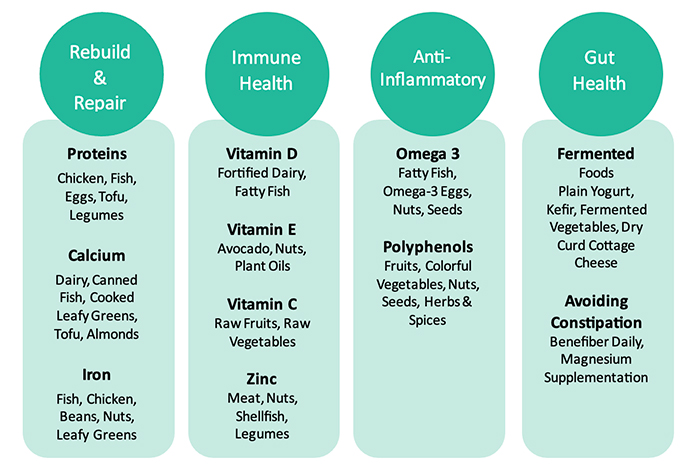Peri-Operative Nutrition
When it comes to preparing for your upcoming surgery, you have a lot on your plate. Making thoughtful decisions as to what you choose to put in your body is just as important for facilitating your surgical outcome as scheduling physical therapy, coordinating help with family and friends, or arranging your home to accommodate for post-operative restrictions. Enhanced Recovery After Surgery (ERAS) is an evidence-based, multidisciplinary team approach to develop a pathway to success with you, the patient, at the very center. Dr. Chahla and his team, together with a group of anesthesiologists, physical therapists, and dieticians, have designed a practice that focuses on elevating your physiologic function before, during, and after surgery to promote optimal recovery post-operatively.
Several factors play a role in executing ERAS well, including decreasing stress and anxiety through adequate preoperative patient education about the expected surgical plan and anticipated recovery. Additionally, on the day of your surgery, your team of talented anesthesiologists works hard to minimize fluid and heat loss during surgery, manage post-operative pain, and prevent nausea and vomiting. Yet, one major aspect of ERAS is augmenting your diet with foods and nutrients to better support healing and recovery.
You have the power to start your recovery today, and we have the tools to help fuel you up.
How do your food choices play a role in recovery?
In general, fluids, electrolytes, and proteins are the key players when it comes to building a plate that optimizes healing and surgical recovery. Your healthy habits begin at breakfast by choosing a meal that is high in protein and colorful fruits, such as berries. By consuming at least 30-45 grams of protein in the morning, then there’s satiety and more energy for healing.

How do you decide what food to eat?

What foods should you avoid eating?
As mentioned earlier, it is critical that we mitigate stress during the time surrounding your surgery. Our body’s response to stress initiates increased production of cortisol, a hormone produced by our adrenal glands. When the stress response is increased and cortisol production is high, our body becomes insulin resistant and hyperglycemic, which can be detrimental in healing and increase recovery time immediately following surgery. Therefore, it is best to try and avoid any foods that spike insulin levels.
Grains
Although typically considered a healthy part of a well-balanced diet, it is best to try and limit the amount of whole grains in your diet leading up to surgery. Whole grains are PRO inflammatory for most people, especially individuals with insulin resistance, prediabetes, diabetes, and/or excess abdominal weight (apple shaped body habitus). Instead, it is best to focus on protein and vegetables/berries. Ideally, try to avoid grains perioperatively, if possible. If you are still hungry after eating a meal high in protein and vegetables, then it is okay to have a small portion of whole grains to satisfy your hunger. Strive to have the smallest tolerable portion, however.
Drinks
Avoid sugar sweetened beverages and juices during the perioperative phase. Due to the added sugar, consuming these drinks leads to a hormonal response of the body that can increase blood pressure and interfere with optimal wound healing.
Protein Shakes
Protein shakes such as Ensure or Boost, while often thought of by many as healthy options for additional protein supplementation, are essentially glorified milkshakes. These protein shakes can impair wound healing and lead to unhealthy weight gain, both of which are less than ideal following your orthopedic surgery. Please avoid. Alternative Option: Look for a protein supplement that contains < 5 grams of carbs. Additionally, avoid a protein supplement that contains sucralose. If the protein supplement does not contain at least 25 grams or more of protein, then it should be avoided. Common examples of healthier options include: Isopure, Naked Whey, Vega Sport, Owyn.
Sugary Foods
Foods high in sugar can increase blood sugar and impair healing of your surgical wound.
Alcohol
Consuming alcohol during the peri-operative period puts excess stress on your body, which can lead to an increase in inflammation and damage of your cells.
Processed Foods
Processed foods can lead to an increase in inflammation and stress levels within our body, which can delay post-operative healing.
Interested in Learning More?
Here at Midwest Orthopaedics at Rush, we want you to feel supported and informed. We offer a wide variety of resources to help prepare you for your upcoming surgery. Continue taking control of your recovery by exploring more at the links below.
- Triple fellowship-trained sports medicine surgeon
- Performs over 800 surgeries per year
- Associate professor of orthopedic surgery at Rush University
- Learn more
